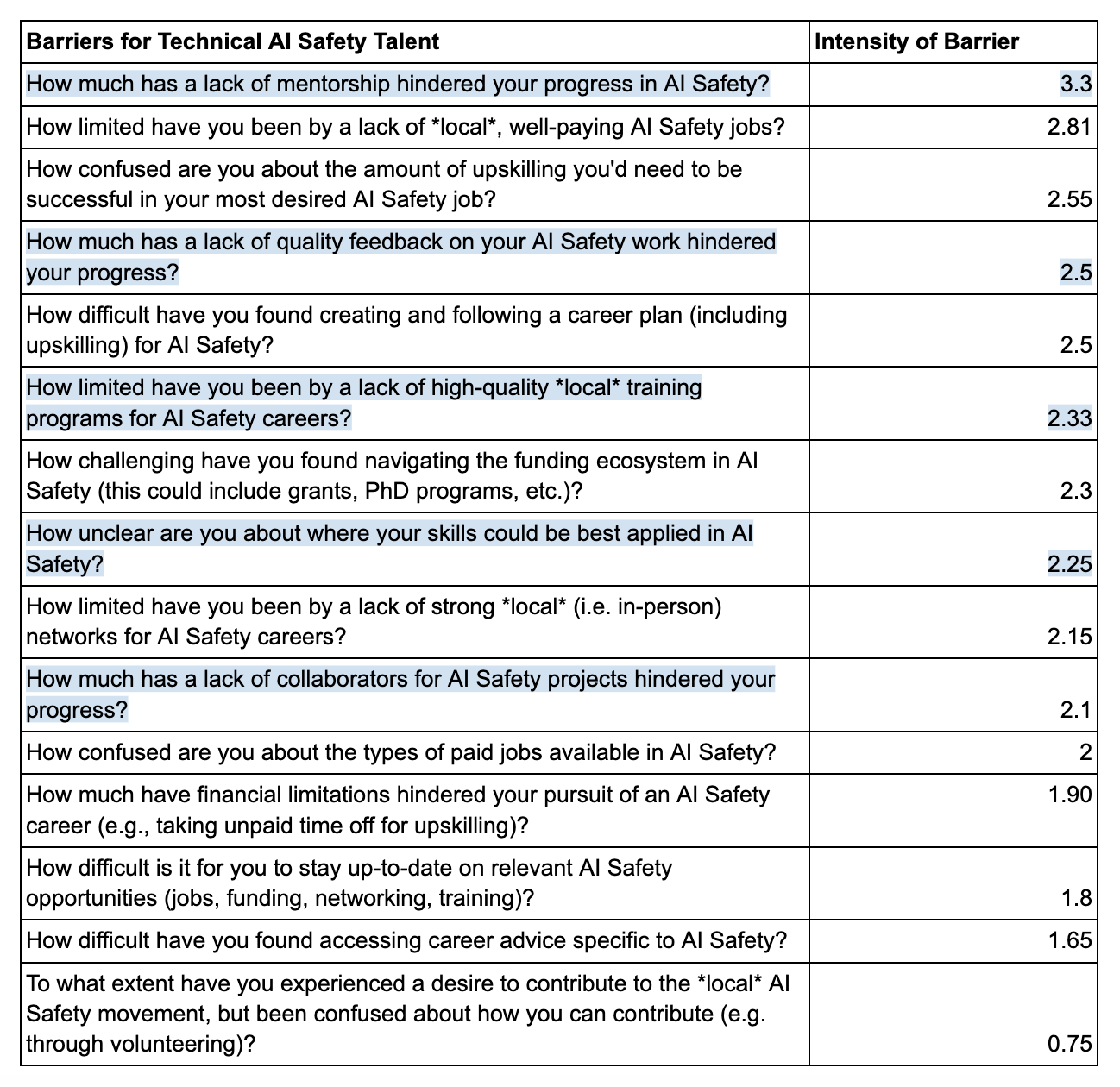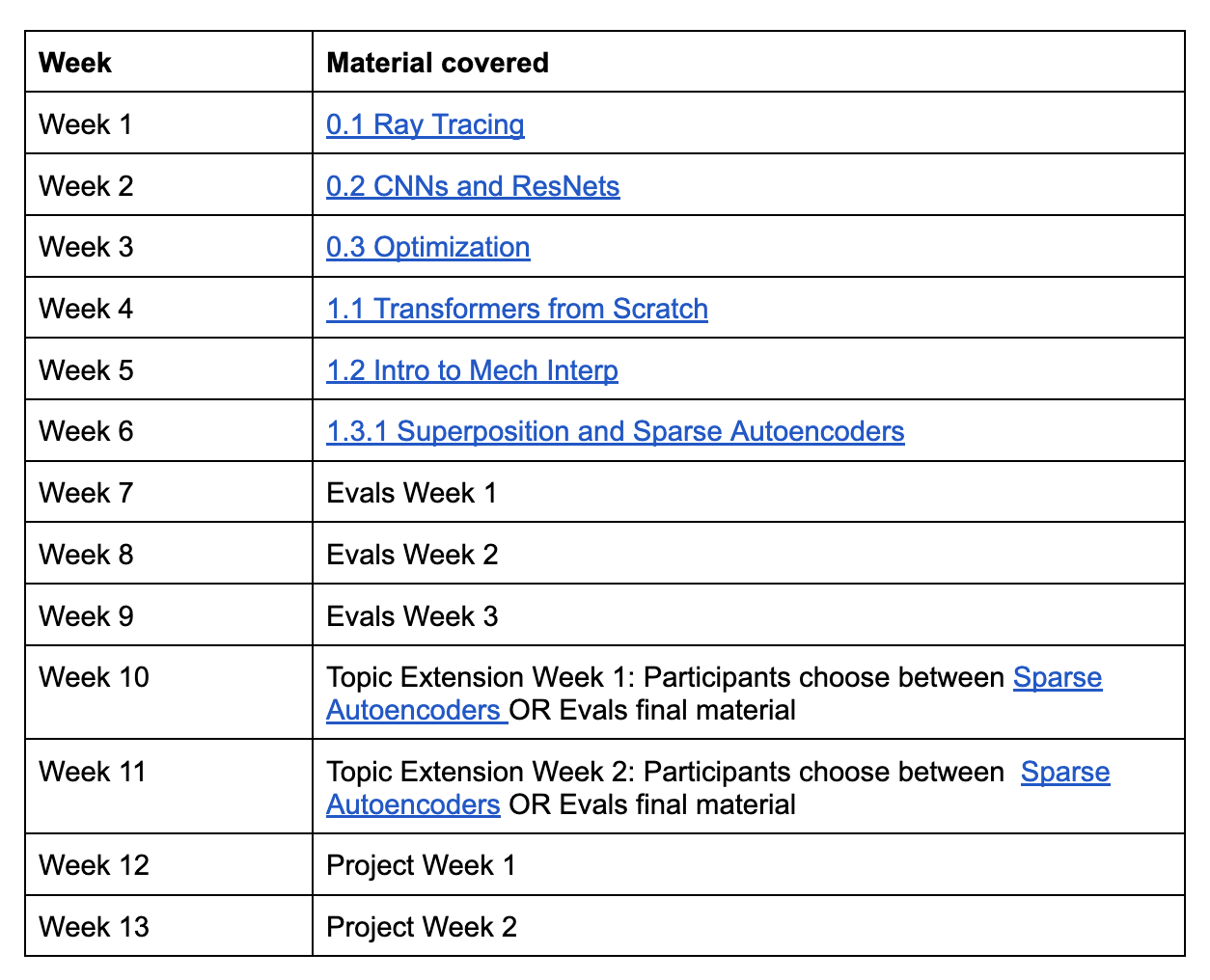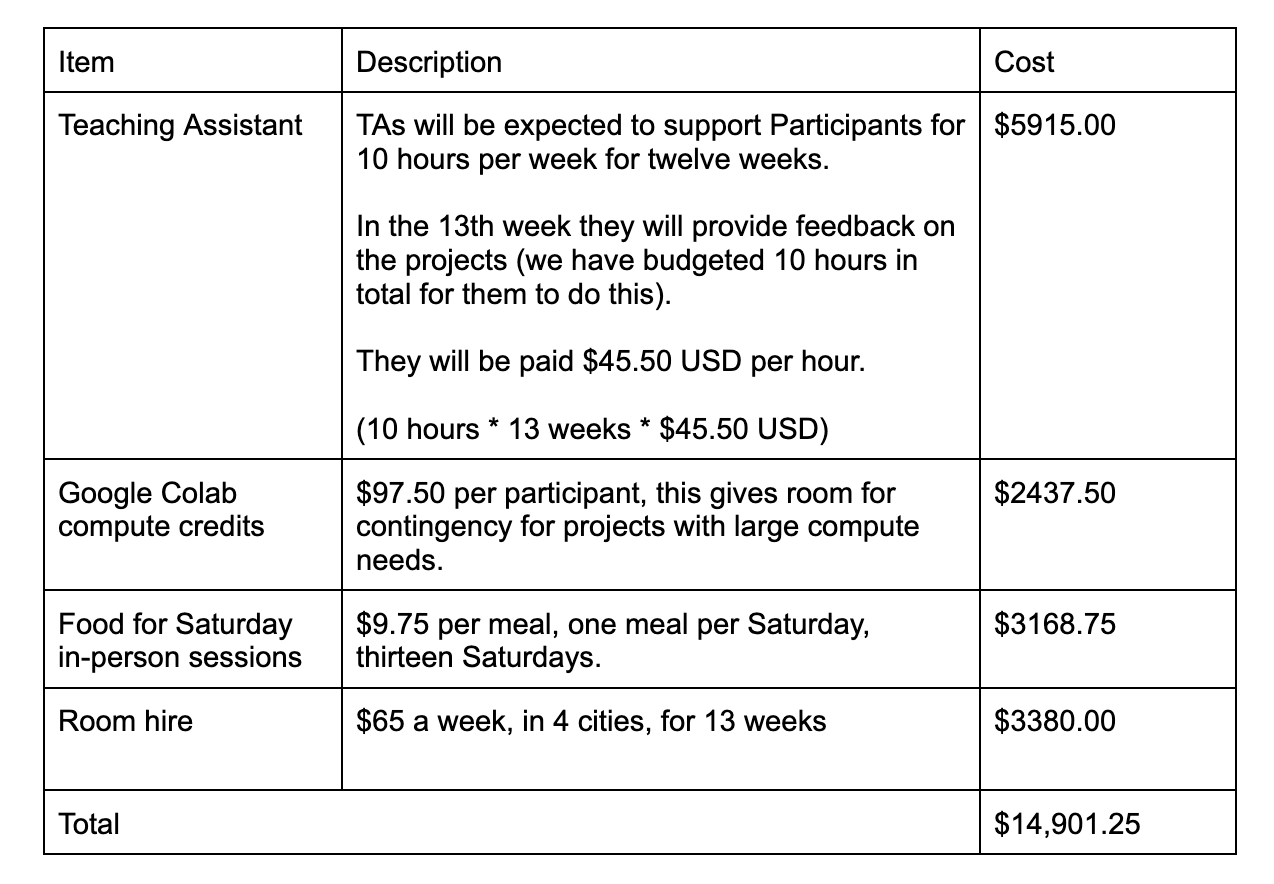Summary
This is a grant proposal for $14,901.25 USD in funding to help launch the inaugural Technical Alignment Research Accelerator (TARA). TARA will be an AI Safety Australia & New Zealand (AIS ANZ) led initiative. Our mission is to grow and support a large, ambitious, and influential local community focused on preventing the most harmful impacts of AI. We do this by providing them with information, education, networks and advice. I (Yanni Kyriacos), Co-Founder / Director of AIS ANZ, will lead the project.
The aim is to run TARA every year from February - May, capturing interest from the annual AIS ANZ Careers Conference in November.
TARA will be a hands-on course based on the Alignment Research Engineer Accelerator (ARENA) curriculum. It will run for 13 weeks (from February to May 2025) and participants are expected to commit 10-15 hours per week to study, which includes meeting in-person with a group in a major ANZ city every Saturday for the duration of the course. While we considered running TARA as an intensive in-person bootcamp like ARENA, the costs of flying and housing participants would increase the budget 5-10x. However, if this first iteration proves successful, future versions of TARA may adopt the traditional bootcamp structure with appropriate funding.
The funding will primarily cover expenses to hire Teaching Assistants ($5,915.00), Google Colab compute credits ($2,437.50, food for Saturday in-person sessions ($3,168.75) and potential room hire ($3,380.00). While we’re hoping to secure free venues through university partnerships, we're budgeting for room hire as contingency. Any unused venue funds will be returned.
The main objective of TARA is to grow the ANZ AI safety community (and movement) by taking motivated and proficient technical talent and upskilling them in safety relevant Machine Learning techniques. It is also important to acknowledge the broader context in which this will occur: it is looking increasingly likely that Australia will launch an AI Safety Institute (AISI), and analogous AISIs appear to preferentially hire technical talent. Staffing the AISI with safety-conscious technical talent will leverage Australia's strategic alliance with the United States to promote robust global AI safety governance.
I will have hands-on support from TARA’s technical organising committee: Ruben Castaing, Lily Stelling, Matt Fisher and Nelson Gardner-Challis. Chris Leong and Ryan Kidd are AIS ANZ advisors and will provide strategic support.
Project Goals (& KPIs)
Develop Technical Talent
Accept 25 participants in inaugural cohort
Achieve 80%+ completion rate
Maintain 80%+ weekly attendance rate
Have >25% of final projects at publication-quality
Achieve >50% transition rate into AI safety roles within 12 months
Build Program Quality
Achieve >4/5 participant satisfaction score
Achieve >4/5 TA satisfaction score
Demonstrate Institutional Credibility
Generate 3+ documented case studies from successful projects
Create repeatable curriculum model for future cohorts
Why run TARA when ARENA already exists?
ARENA is very selective and out of reach for most ANZ talent, as it requires relocating overseas and taking extended time off work. While ARENA maintains high standards, this means significant local talent goes undeveloped. By offering a part-time, locally-based program, TARA can develop this talent pool while participants maintain their careers.
Australia has a strong track record of producing world-class AI safety talent, including Jan Leike (Anthropic), Buck Shlegeris (Anthropic), Dr Ramana Kumar (Prev. Senior Research Scientist on AGI Safety at Google Deepmind) and others who have gone on to lead critical work at major AI safety organizations. TARA aims to build on this legacy while making technical AI safety more accessible to local talent.
Moreover, establishing a rigorous technical AI safety program demonstrates to the Australian government that the local AI safety community is serious, organized, and capable of producing high-caliber technical talent. This credibility will be particularly valuable as Australia likely develops its AI Safety Institute and looks to the local community for expertise and staffing.
While initially based on ARENA's proven curriculum, TARA will have the flexibility to expand its technical content in future iterations as AI safety research evolves.
Target audience
Software engineers and ML practitioners transitioning into AI safety
Postgraduate computer science / mathematics students from institutions such as The Australian National University, The University of Sydney, The University of Melbourne and The University of Queensland.
Technical professionals who can't commit to full-time programs like ARENA
Local technical talent likely interested in working at the future AISI
In May 2024, AIS ANZ conducted interviews (and a follow-up survey) with 21 people considered high-prospect technical talent in ANZ. TARA aims to address five out of their top ten barriers to impact (highlighted in blue).
A Likert scale was used to measure the intensity of each barrier;
Not at all (0)
Slightly (1)
Somewhat (2)
Moderately (3)
Very (4)
Extremely (5)

Entry Requirements
Strong Python programming background
Basic understanding of deep learning concepts
Working knowledge of linear algebra, probability and statistics
Ability to commit to 10-15 hours per week for 13 weeks
Ability to attend weekly in-person sessions
Located in or able to travel to major ANZ cities
High level timeline
2024
End of November: Funding approved, begin TA recruitment
December: Secure locations in Sydney, Melbourne and Brisbane
December: Complete TA recruitment
December: Participant applications open
2025
Mid January: Applications close
Late January: Participant selection and notification
Early February: Onboarding and setup
Mid February: Program launch
February-April: Core curriculum
May: Final projects and presentations
June: Program evaluation and planning for next cohort
Which cities will it run in?
TARA will likely initially operate in Australia's major east coast hubs - Sydney, Melbourne, and Brisbane - where approximately 50% of the region's technical talent is concentrated. Each city will have a dedicated location for in-person sessions.
Additional satellite locations in other Australian and New Zealand cities may be established based on applicant strength and geographic clustering. Even small groups of 2 exceptional applicants in cities like Adelaide, Perth, Wellington, or Auckland could warrant establishing a local cohort. This flexible approach ensures we don't miss out on strong talent while maintaining program quality.
TARA Teaching Structure
The TA role is critical to TARA's success and will be our first priority once funding is secured. We plan to support up to six learning groups of maximum six participants each, with flexibility in TA arrangements based on candidate availability.
Staffing Models (in order of preference):
Primary Model: Single Lead TA
One experienced TA oversees all groups for the full program duration
Ensures consistency in teaching
Optimal for program coordination
While challenging to staff, this is our preferred approach
Modular Model: Rotating TAs
Different TAs cover specific course modules
Leverages specialised expertise for different topics
Provides flexibility for TAs with limited availability
TARA Group Structure
Maximum 6 participants per learning group
Maximum 6 learning groups total
Smaller satellite locations (2-3 participants) will be merged virtually
Each group receives about 1.5 hours of dedicated TA time per week
Mixed in-person and virtual support based on geographic distribution
Weekly Learning Structure
Each week is structured to maximize learning while accommodating participants' work commitments:
Independent Learning (3-4 hours)
Self-paced study of core concepts
Preparation exercises for Saturday sessions
Saturday In-Person Sessions (6-8 hours)
Intensive paired programming sessions
Hands-on implementation of concepts
Direct access to Teaching Assistants
Group discussion and problem-solving
Weekly Support
Ongoing support via Slack throughout the week
Optional peer study groups
Weekly homework review and feedback
Course Timeline

Venue Details
While we’re hoping to secure free venues through university partnerships, we're budgeting for room hire as contingency. Any unused venue funds will be returned
Budget Breakdown (USD)

Prior Experience/Track Record
Since founding AI Safety Australia & New Zealand, we have rapidly established ourselves as an important AI safety organisation in the region, demonstrating strong execution and community building. Over the past six months, we accomplished the following:
I (Yanni Kyriacos) also have direct experience designing and running structured educational programs. While serving as Associate Strategy Director at Edge Marketing Agency, I developed and led an intensive 8-week internship program for six emerging students from diverse backgrounds including design, strategy, marketing, content, business development, and account management. I personally managed the full lifecycle of the program - from recruitment through to final delivery - including pairing interns with appropriate mentors and securing a real-world client brief from RESULTS Australia. Under my mentorship, the cohort successfully collaborated to deliver meaningful work for an established non-profit organization, demonstrating my ability to guide diverse groups through complex learning experiences while delivering tangible value to stakeholders.
This track record demonstrates our ability to:
Execute large-scale technical programs
Build and maintain engaged communities
Connect with key stakeholders across academia, industry, and government
Identify and develop talent in the AI safety space